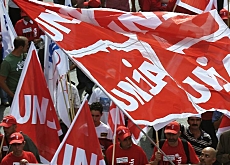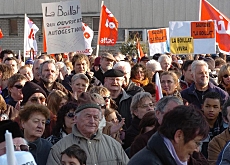Strikes could threaten good Swiss image

Switzerland's reputation as a reliable business partner is at risk if a recent increase in strike action is maintained, Swiss employers have warned.
Swiss workers are still much more reluctant to down tools than their counterparts in neighbouring countries. But a long-running strike in 2006 highlights a recent change in industrial relations.
Figures from the State Secretariat for Economic Affairs (Seco) show a marked increase in strike action in the first five years of this decade compared with the early 1990s.
These statistics are backed up by research from Basel University historian Bernard Degen that shows more workers joined the picket line in the past five years than at any time since the 1920s.
Early this year, workers at a Swissmetal factory in Reconvilier in northwestern Switzerland staged a month-long strike in protest at planned job cuts. The duration of the industrial action is highly unusual in Switzerland, and Swissmetal have threatened to sue the country’s largest union, Unia, over their handling of the situation.
Export fears
Thomas Daum, director of the Swiss Employers’ Association, played down the significance of the Swissmetal strike but said a continued escalation of industrial action could have future consequences.
“The industrial action we have seen in recent years is higher than we are used to, but it is still low compared with other European countries,” he told swissinfo. “But if we see too many future strikes then it could damage the Swiss economy.”
“On the export side Switzerland is known as a country with industrial peace that therefore guarantees quality and reliability. This image helps us on the international markets and it could cause us damage in the long run if it is lost.”
Aside from Swissmetal, former Crossair pilots now at Swiss International Air Lines held a 24-hour strike in September that led to more than 140 flights being cancelled. The dispute over pay and conditions has been running since the creation of Swiss in 2002.
Threatened industrial action by postal and railway workers was diverted at the 11th hour in mid-December when management and public sector unions reached agreement over restructuring at Swiss Post and the Federal Railways.
Had these actions gone ahead it would have been the first time such workers had downed tools since the general strike of 1918.

More
Swiss Trade Union Federation
Arrogant managers
Trade Union Federation spokesman Ewald Ackermann said the increased trend towards industrial action since the mid-1990s could be explained by worsening economic conditions, a new generation of workers less willing to accept conditions, and a new breed of managers.
“At the start of the 1990s we saw a new generation of managers arriving on the scene who were very arrogant in relation to salary negotiation,” he told swissinfo.
“This heated up the atmosphere and has generated a kind of class warfare. The new generation of workers is more pragmatic than the last and no longer says ‘we must never strike’.”
Thomas Daum has his own theories about the causes of worsening industrial relations. He puts it down to a toughening of global competition that squeezes firms, coupled with a new attitude amongst unions.
“The trade unions have for some years tried to get more public attention with actions, demonstrations and other events. There is a public relations factor behind their pronouncements,” he said.
Neither Ackermann nor Daum could predict what lies in store next year, but both believe current discontent over pay and conditions in the construction industry has potential to ignite in the next few months.
swissinfo, Matthew Allen
Official government statistics reveal that 19,545 working days were lost to industrial action in Switzerland between 1990 and 1995. This compares to 92,750 lost working days between 2000 and 2005.
Days lost to strikes in 2005 totalled 1,392 while 38,915 days were lost in 2004. Figures for 2006 have not yet appeared, but are certain to top last year due to the Swissmetal strike.
Research by Dr Bernard Degen at the University of Basel shows that the 24,399 workers who downed tools in 2004 was comparable to the number of people who took part in the General Strike of 1918.
Before 1998, the last example of at least 15,000 workers on strike in any one year was in 1946. The highest recorded year of strike action, in terms of numbers of strikers, was 1907 when some 32,000 took to the picket line.

In compliance with the JTI standards
More: SWI swissinfo.ch certified by the Journalism Trust Initiative




You can find an overview of ongoing debates with our journalists here . Please join us!
If you want to start a conversation about a topic raised in this article or want to report factual errors, email us at english@swissinfo.ch.